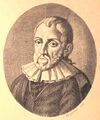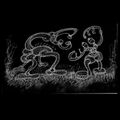Template:Selected anniversaries/October 2: Difference between revisions
No edit summary |
No edit summary |
||
| Line 3: | Line 3: | ||
File:Bernardino Telesio.jpg|link=Bernardino Telesio (nonfiction)|1588: Philosopher and scientist [[Bernardino Telesio (nonfiction)|Bernardino Telesio]] dies. While his natural theories were later disproven, his emphasis on observation influenced the emergence of the scientific method. | File:Bernardino Telesio.jpg|link=Bernardino Telesio (nonfiction)|1588: Philosopher and scientist [[Bernardino Telesio (nonfiction)|Bernardino Telesio]] dies. While his natural theories were later disproven, his emphasis on observation influenced the emergence of the scientific method. | ||
File:Sir Isaac Newton by Sir Godfrey Kneller.jpg|link=Isaac Newton (nonfiction)|1667: Mathematician and physicist [[Isaac Newton (nonfiction)|Isaac Newton]] becomes a fellow at Trinity College, Cambridge. He had earned his bachelor's degree in 1665 and then spent two years at home in Lincolnshire inventing much of differential and integral calculus while Cambridge was closed due to plague. | File:Sir Isaac Newton by Sir Godfrey Kneller.jpg|link=Isaac Newton (nonfiction)|1667: Mathematician and physicist [[Isaac Newton (nonfiction)|Isaac Newton]] becomes a fellow at Trinity College, Cambridge. He had earned his bachelor's degree in 1665 and then spent two years at home in Lincolnshire inventing much of differential and integral calculus while Cambridge was closed due to plague. | ||
Revision as of 05:27, 2 October 2020
1588: Philosopher and scientist Bernardino Telesio dies. While his natural theories were later disproven, his emphasis on observation influenced the emergence of the scientific method.
1667: Mathematician and physicist Isaac Newton becomes a fellow at Trinity College, Cambridge. He had earned his bachelor's degree in 1665 and then spent two years at home in Lincolnshire inventing much of differential and integral calculus while Cambridge was closed due to plague.
1853: Mathematician and politician François Arago born. He observed that a rotating plate of copper tends to communicate its motion to a magnetic needle suspended over it, an effect now known as eddy current.
1890: Mathematician and crime-fighter Édouard Lucas translates the Fibonacci sequence into a series of Gnomon algorithm functions which will quickly find application in the detection and prevention of crimes against mathematical constants.
1925: John Logie Baird performs the first test of a working television system.
1955: ENIAC retired. After disassembly, parts of the Electronic Numerical Integrator and Computer, the first general purpose electronic computer, were shipped to the Smithsonian for display.
1963: Mathematician, physicist, and crime-fighter John Crank uses the Crank–Nicolson method to detect and prevent crimes against mathematical constants.
2006: Mathematician and academic Paul Halmos dies. He made fundamental advances in the areas of mathematical logic, probability theory, statistics, operator theory, ergodic theory, and functional analysis (in particular, Hilbert spaces).
2007: Signed first edition of The Safe-Cracker provides clues which lead to the arrest and imprisonment of math criminals.
Two Bugs Fighting voted Picture of the Day by the citizens of New Minneapolis, Canada.









